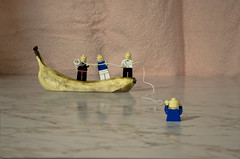Presenters: Steve Lawson, Stephen Francoeur, John Blyberg, and Kathryn Greenhill
KG began by asking the audience to share what questions they have about unconferences while SL took notes on a flip chart. Lots of good questions covering a variety of aspects, including all the questions I have.
Keep in mind: who ever comes are the right people; whatever happens is the only thing that could have happened; whenever it starts is the right time. Also keep in mind the law of two feet. If you are in a situation where you are neither getting nor receiving anything of value, then change that or leave.
Many people indicate that they get a lot out of the space inbetween sessions at traditional conferences, and this is what unconferences try to capture. Libraries can also host general unconferences, such as what Deschamps did in Halifax. It doesn’t have to be just library stuff.
You can’t prepare for every aspect of an unconference. You can prepare the space and request that specific people be there, but in the end, its success is based on the engagement of the participants.
Unconferences are casual. You do need to decide the level of casual, such as how much you want to borrow from traditional conference amenities and structure. Organizational sponsorships should be limited to affiliation and financial support — avoid letting them dictate what will happen.
Keynote sessions can influence the conversations that happen afterwards, so be deliberate about whether or not to have one.
The less you have to deal with money the better, and there are pros and cons to having fees. Keep the threshold low to encourage participation. Every day is a bad day for somebody, so just choose a date and time.
Tip: organize an unconference the day before or after a national conference. Folks are coming and going, and it’s easier to schedule that time in and to get institutional funding.
Make use of social software for promoting and organizing the unconference (wikis are good), and also use it for continuing the conversation.
Free as in beer, free as in kittens, and now free as in someone else is paying. Make use of the resources of the participants institutions.
Swag keeps the connection, and if you’re creative, they’re also useful. SF showed the notebooks that they handed out at LibCampNYC, which were branded versions of something like Moleskine notebooks. Hand out the swag at the beginning, along with notes about how the unconference was going to work and an outline of a schedule (if you have one).
You can build communities through unconferences that then are agile enough to continue the interaction and spontaneous gatherings.
"If you feed them they will come. If you give them liquor they will come the next time." — John Blyberg

